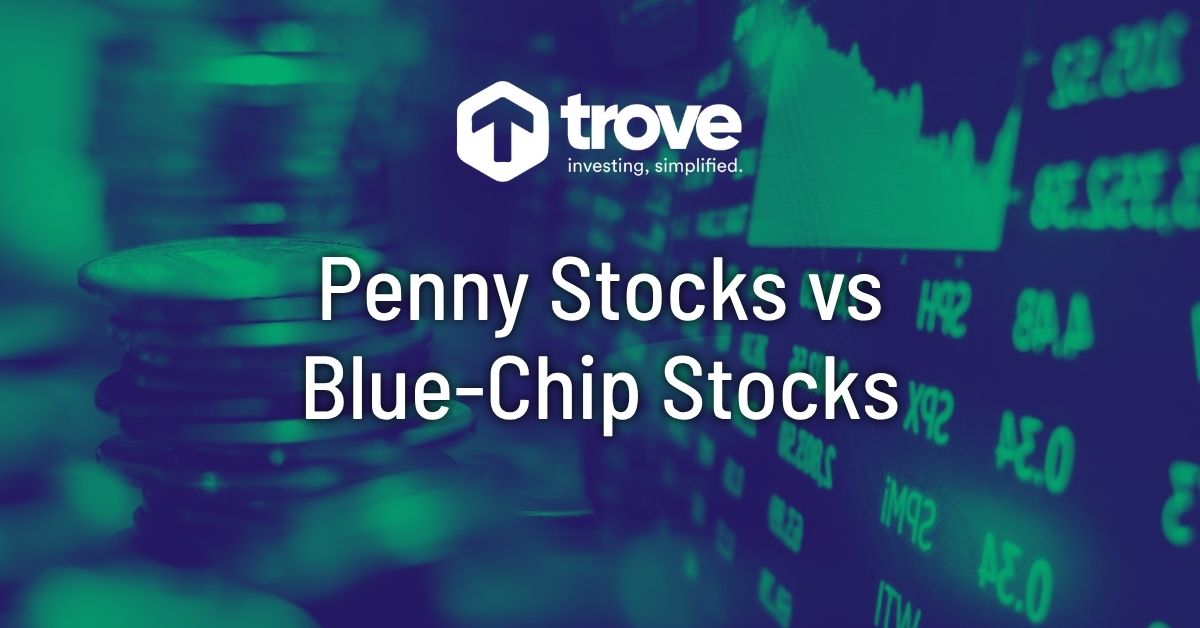When it comes to investing, there’s no one-size-fits-all. The stock market is vast, with a wide array of options to choose from. There are different types of stocks, and penny stocks and blue-chip stocks are part of them.
But the big question is: which is better for you?
I want you to understand that the choice between penny stocks and blue-chip stocks isn’t just about choosing one over the other. It’s about understanding the risks, the potential rewards, and how each option fits into your broader financial strategy.
By the end of this blog post, you’ll have a clearer picture of what penny stocks and regular stocks are, how they differ, and which might be the better option for your investment journey.
What are Penny Stocks?
They’re typically small companies’ stocks that trade for less than $5 per share. In other words, they are small companies’ shares that trade for a relatively low price. Because of their low prices, penny stocks are accessible to almost anyone, even if you don’t have a lot of capital to invest.
However, they may look cheap compared to other common stocks such as Tesla or Apple, but they’re much more expensive, despite their lower price tag.
Penny stocks are highly volatile. Their prices can swing wildly in a short period, making them a risky investment. The very reason they can multiply your money in a flash is the same reason they can wipe out your investment just as quickly.
What are Blue-Chip Stocks?
Blue-chip stocks are stocks of large, established, and financially sound companies with a history of reliable performance. In Nigeria, companies like Dangote Cement, Nigerian Breweries, and MTN Nigeria are considered blue-chip stocks. Globally, companies like Apple, Microsoft, and Coca-Cola are prime examples.
Investing in blue-chip stocks is often seen as a safer bet. These companies have been around for a long time, they dominate their industries, and they have a track record of steady growth. When you buy a blue-chip stock, you’re investing in a company with a proven business model, strong financials, and a stable future. For example, imagine buying shares of Dangote Cement. You know that cement is a critical component in construction, and with the growing demand for infrastructure development in Nigeria, this company isn’t going anywhere anytime soon.
Blue-chip stocks also tend to pay dividends, which are payments made to shareholders out of the company’s profits. This means that even if the stock price isn’t soaring, you’re still earning a return on your investment. Dividends can be a great way to generate passive income, which is why many investors prefer blue-chip stocks for their long-term portfolios.
Are there downsides? Of course, yes!
Blue-chip stocks are generally more expensive than penny stocks. If you’re just starting out with a limited budget, it might feel like you can only afford a few shares. However, the stability and lower risk associated with blue-chip stocks often make them worth the investment.
Over time, the steady growth of these companies can lead to significant returns, and the dividends can provide a nice income stream.
Key Differences Between Penny Stocks and Blue-Chip Stocks
1. Risk and Volatility
Penny stocks are highly volatile and come with a high risk of loss. The potential for huge gains is offset by the potential for significant losses. Blue-chip stocks, in contrast, are generally less volatile and carry lower risk.
2. Company Size and Stability
Penny stocks usually represent smaller, less established companies. These companies might be new or struggling financially. Blue-chip stocks belong to large, established companies with a proven track record and strong market position.
3. Liquidity
Penny stocks can be less liquid, meaning it might be difficult to find buyers or sellers when you want to trade. Blue-chip stocks are highly liquid, with plenty of buyers and sellers, making them easier to trade.
4. Information Availability
Penny stocks often have limited information available, making it harder to conduct thorough research. Unlike blue-chip stocks, which are followed by analysts and reported on extensively.
5. Dividends
Most penny stocks do not pay dividends. Blue-chip stocks often pay regular dividends, providing a steady income stream for investors.
Penny Stocks or Blue-chip Stocks, Which Is a Better Investment?
The choice between penny stocks and blue-chip stocks depends on your risk tolerance, investment goals, and the amount of capital you have to invest. If you’re someone who enjoys taking risks and has the time to closely monitor your investments, penny stocks might offer the thrill and potential rewards you’re looking for. Just remember, that the risks are high, and you need to be prepared for the possibility of significant losses.
On the other hand, if you’re looking for stability, steady growth, and a reliable income stream through dividends, blue-chip stocks are the way to go. They might not make you rich overnight, but they can help you build wealth over time without the stress and uncertainty that come with penny stocks.
For Nigerian investors, it’s essential to consider the local market conditions as well. While the Nigerian Stock Exchange offers opportunities in both penny stocks and blue-chip stocks, the overall economic environment can impact the performance of these investments. Diversifying your portfolio by investing in a mix of both might be a good strategy to balance risk and reward.

Read Also: What is a Capital Market?
Conclusion
Understanding the differences between penny stocks and blue-chip stocks is a critical step in making informed decisions. While penny stocks offer the allure of quick riches, they come with significant risks that can’t be ignored. Blue-chip stocks, though more expensive and slower to grow, offer stability, reliability, and a steady income through dividends.
If you’re just starting out, it might be wise to dip your toes into blue-chip stocks first. They provide a solid foundation on which you can build your investment portfolio. Once you’ve gained some experience and are more comfortable with the market, you can explore penny stocks with a portion of your investment funds. But, Ultimately, the choice is yours to make.




